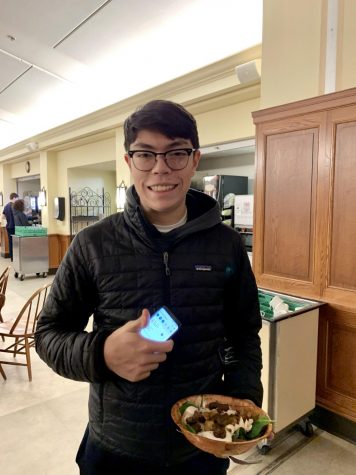Explore the World: Studying Languages at Kent
April 11, 2021
Devoted to inspiring student growth in all fields, Kent School offers a multitude of languages, both modern and classic, including Spanish, French, Chinese, Latin, Greek, Italian, and Russian. Students also have conducted independent studies in American Sign Language and Persian. Having been the department head of the modern language department for at least six years, Mrs. Benjamin explains that the reasoning behind the three-year language requirement is for students to gain “a certain degree of proficiency” so one can “travel and be able to communicate.” She also believes in the importance of having global awareness and understanding that we’re learning languages used by millions of people each day.
With large student enrollment, both Spanish and French offer regular and honors sections for levels 1-3, AP Spanish and AP French, as well as Spanish and French literature. Every year, either Italian or Russian is offered for students who have already met the language requirement. Mrs. Benjamin, who speaks French, Italian, Spanish, German, Russian, Dutch, and Portuguese, eagerly exposes students who already have a background in Romance languages to Italian. Mrs. Gogola, who teaches French but is a native Russian speaker, teaches Russian and helps students conduct independent study in Russian if they wish to advance beyond the first-year level of that language.
When new students come to Kent, most of them have already had a certain degree of exposure to the language of their interest, so they take placement tests to be placed in the appropriate level. According to Mrs. Benjamin, placement tests have evolved over the years and have simplified. Currently, she tests the student’s familiarity with verb tenses, their listening skills, and their ability to speak in that language.
As Kent moves away from the AP curriculum, Mrs. Benjamin assures that Advanced Studies Spanish and Advanced Studies French will still prepare students for the AP exam because the teachers and the College Board share a common goal of helping students develop the ability to speak, to read, to write, and to communicate. “Maybe we’ll spend a little less time practicing the multiple-choice,” chuckles Mrs. Benjamin.
Noticing that College Board offers the AP Spanish Literature course while Kent School presents three terms of Spanish Literature elective, Mrs. Benjamin explains that the prescribed curriculum is very restrictive and that students usually have trouble fitting in year-long courses into their schedules. Kent School also offers French literature, but the College Board took away that AP, giving Kent teachers more flexibility in the works explored.
Not only does Kent offer Romance languages, but we also offer Chinese. Dr. Meng has been teaching Chinese 1-4 at Kent for almost 20 years. Emphasizing producing language and writing characters by hand, Dr. Meng does not follow the AP curriculum and does not prepare students for the AP Chinese exam, which is taken on the computer. When typing in Chinese, one types its “pinyin,” a combination of letters from the English alphabet that helps readers with its pronunciation, instead of the actual characters. Different from English and Romance languages, Chinese characters do not guide their readers to their pronunciation. After students learn some basic characters, Dr. Meng asks students to stop using “pinyin” to prevent them from relying on that tool. In the 20th century, simplified Chinese, in which the same character is written with fewer strokes, was invented to encourage literacy in China. Since then, mainland China has used simplified Chinese, though Chinese speakers are able to comprehend written traditional Chinese because the two share a certain degree of similarity. At Kent, Dr. Meng requires students to be able to write simplified Chinese, yet some very passionate students ask for the traditional form of every character. It is Dr. Meng’s wish that students lay a solid foundation for Chinese characters during their time in her class.
Aside from modern languages, Kent also offers classic languages, Greek and Latin. According to Mr. McDonough, the goal is “to help students read and appreciate the authors of the Greek and Roman world in their original languages” as well as understand “how their worlds are connected to our own.” In Greek classes, teachers emphasize the “continuous linguistic and literary tradition from Ancient to Modern Greek,” while in Latin, teachers demonstrate the relationship between Latin to the English vocabulary and the Romance languages. Though Latin is often remembered as a dead language, it remains alive in the world of philosophy and science. Different from modern languages, students are expected to be more reflective and ponder the possible meanings and interpretations of classical texts. In class, students engage in discussions from simple grammar and vocabulary to sophisticated literary interpretations. “It is that experience, being able to hear something both strange and familiar, both incredibly distant and incredibly close to us, that is at the heart of what we do,” Mr. McDonough shares. Readers of Homer or Plato or other classical texts participate in great conversations that started almost three thousand years ago and still continue today. “Classics is language for time travelers,” Mr. McDonough smiles.






